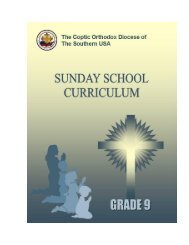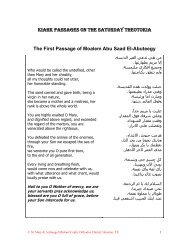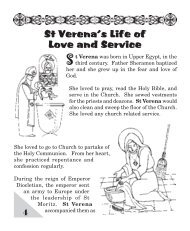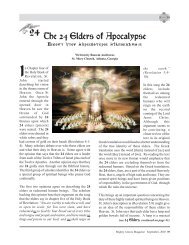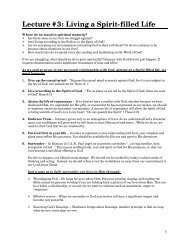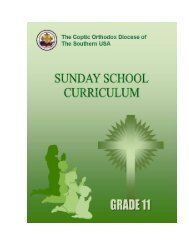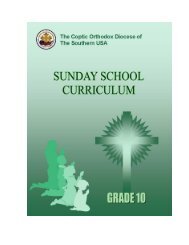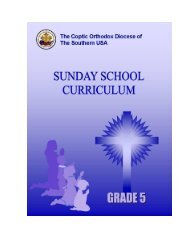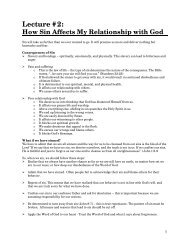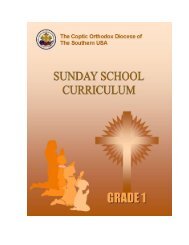Grade 12 - Coptic Orthodox Diocese of the Southern United States
Grade 12 - Coptic Orthodox Diocese of the Southern United States
Grade 12 - Coptic Orthodox Diocese of the Southern United States
You also want an ePaper? Increase the reach of your titles
YUMPU automatically turns print PDFs into web optimized ePapers that Google loves.
Sunday School Curriculum <strong>Grade</strong> <strong>12</strong><br />
Week 4 - Judge Not O<strong>the</strong>rs<br />
Objective:<br />
To understand <strong>the</strong> difference between judging people and judging events.<br />
To refrain from <strong>the</strong> sin <strong>of</strong> judging o<strong>the</strong>rs.<br />
Memory Verse:<br />
―Do not judge, so that you may not be judged. For with <strong>the</strong> judgment you make, you will be<br />
judged‖ (Mat<strong>the</strong>w 7:1).<br />
References:<br />
―Do not Judge‖ by Pope Shenouda III<br />
―Paradise <strong>of</strong> <strong>the</strong> spirit‖ Part 1, Bishop Youanis, Chapter 8<br />
Introduction:<br />
The sin <strong>of</strong> judging o<strong>the</strong>rs is dangerous because many do not feel <strong>the</strong>y are committing that sin.<br />
It is a sin that robs God <strong>of</strong> His right in Judgment.<br />
To what extent should we understand <strong>the</strong> commandment <strong>of</strong> not judging o<strong>the</strong>rs?<br />
Can we judge actions and not judge o<strong>the</strong>rs?<br />
Lesson Outline:<br />
I. Types Of Judgment Against O<strong>the</strong>rs<br />
A. Judging by <strong>the</strong> mind<br />
This might be a spiritual way for <strong>the</strong> thoughts to become a mere screen showing whatever wrong<br />
feelings and dreadful thoughts found in <strong>the</strong> heart.<br />
B. Judging by <strong>the</strong> tongue<br />
It has various kinds among which are:<br />
a) Backbiting: speaking in <strong>the</strong> absence <strong>of</strong> someone. It is harmful because <strong>the</strong> person who is<br />
insulted in secret has no chance to defend himself because he does not know about <strong>the</strong> matter.<br />
b) Slander: is defaming o<strong>the</strong>rs, revealing <strong>the</strong>ir faults or ascribing faults to <strong>the</strong>m. It is a disease<br />
spread among many whenever <strong>the</strong>y find nothing useful to speak about, <strong>the</strong>y make <strong>of</strong> <strong>the</strong><br />
peoples‘ bad news a favorite material <strong>of</strong> <strong>the</strong>ir talk.<br />
c) Condemnation: which means judging a person as guilty. There is a difference between partial<br />
condemnation and whole condemnation. For example, <strong>the</strong>re is a difference between saying<br />
that someone is a liar in a certain situation and saying that he is a liar. There is still a difference<br />
between condemning one individual and condemning a group. Among <strong>the</strong> examples <strong>of</strong><br />
general condemnation is <strong>the</strong> condemnation <strong>of</strong> <strong>the</strong> Gentiles by <strong>the</strong> Jews.<br />
C. Judging by printed material and cassette recording<br />
Judging may be through printed material published and distributed in thousands <strong>of</strong> copies or<br />
through a book or a pamphlet.<br />
PENTECOST PERIOD 153



